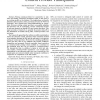Free Online Productivity Tools
i2Speak
i2Symbol
i2OCR
iTex2Img
iWeb2Print
iWeb2Shot
i2Type
iPdf2Split
iPdf2Merge
i2Bopomofo
i2Arabic
i2Style
i2Image
i2PDF
iLatex2Rtf
Sci2ools
INFOCOM
2009
IEEE
2009
IEEE
Network Pricing and Rate Allocation with Content Provider Participation
Abstract—Pricing content-providers for connectivity to endusers and setting connection parameters based on the price is an evolving model on the Internet. The implications are heavily debated in telecom policy circles, and some advocates of “Network Neutrality” have opposed price based differentiation in connectivity. However, pricing content providers can possibly subsidize the end-user’s cost of connectivity, and the consequent increase in end-user demand can benefit ISPs and content providers. This paper provides a framework to quantify the precise trade-off in the distribution of benefits among ISPs, content-providers, and end-users. The framework generalizes the well-known utility maximization based rate allocation model, which has been extensively studied as an interplay between the ISP and the end-users, to incorporate pricing of content-providers. We derive the resulting equilibrium prices and data rates in two different ISP market conditions: competition and monopoly...
| Added | 24 May 2010 |
| Updated | 24 May 2010 |
| Type | Conference |
| Year | 2009 |
| Where | INFOCOM |
| Authors | Prashanth Hande, Mung Chiang, A. Robert Calderbank, Sundeep Rangan |
Comments (0)

